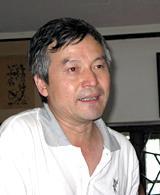He Weifang
He Weifang | |
|---|---|
 | |
| Born | 17 July 1960 |
| Weiquan lawyers |
|---|
He Weifang (born July 17, 1960; Chinese: 贺卫方; pinyin: Hè Wèifāng) is a professor at Peking University of China and an activist striving to reform the Chinese judicial system, who has argued that the Communist Party of China is an unregistered and therefore illegal organization in China.[1]
He earned a B.A. at Southwest University of Political Science & Law, and an LL.M at Peking College of Political Science and Law (former China University of Political Science and Law).
He was an associate professor in China University of Political Science and Law from 1985 to 1995, then become a professor and Ph.D. adviser at Peking University.
Since 1992, he has striven to reform the Chinese judicial system. He has written many papers on the importance of modernizing China's judicial system, earning him the nickname "Justice He". His works includes The Judicial Ideals and Institutions and The Ways to Carry Justice.
Because of his public support and signing for Liu Xiaobo's Charter 08, He Weifang's position at Peking University become untenable and he was forced to resign.[2] In 2008 he had accepted a job offer to be the dean of the law school of Zhejiang University. However, the Communist Party of China forced the school to withdraw the job offer, and He was instead given a position in the remote city of Shihezi in Xinjiang.[3] Richard McGregor, author of The Party: The Secret World of China's Communist Rulers, said that this was "a deliberately humiliating transfer, akin to a Harvard Law School professor being reassigned to a small community college in rural Texas" and that the party had "nailed" He "with a little more subtlety."[3]
On October 6, 2010 Prof He Weifang gave a speech at Stockholm University, concerning reform of Chinese Court Organization Law and freedom of speech.[4]
References
- McGregor, Richard. The Party: The Secret World of China's Communist Rulers. Harper Perennial: New York, 2012. ISBN 978-0-06-170876-3. Originally published in 2010 by Allen Lane, a Penguin Books imprint.
Notes
- ^ Paula Chakravartty; Yuezhi Zhao (2008). Global Communications: Toward a Transcultural Political Economy. Rowman & Littlefield Publishers. pp. 47–. ISBN 978-0-7425-4044-6. Retrieved 15 March 2013.
- ^ Jean Béja; Hualing Fu; Eva Pils (31 August 2012). Liu Xiaobo, Charter 08 and the Challenges of Political Reform in China. Hong Kong University Press. p. 107. ISBN 978-988-8139-06-4. Retrieved 15 March 2013.
- ^ a b McGregor, p. 26.
- ^ Professor He Weifang, 贺卫方 (In Chinese)
